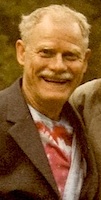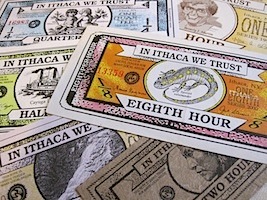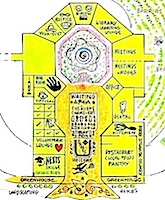




 |
 |
 |
 |
 |
| PAUL GLOVER ESSAYS: community
control of food, fuel, housing, health care,
planning, education, finance. |
| HOME | INTRO | CURRENCY | SUCCESSES | HOW-TO BOOK | PUBLICITY | ESSAYS |
|
Cornell's Activist History
and Future August 1999 Cornell and Ithaca were quiet, white, Republican places until the Sixties. Ithaca was the birthplace of the ice cream sundae. The Klan had an office on State Street. And Nixon clobbered Kennedy here in 1960. Campus activism during the 1950s had seen little more than rotten eggs thrown at President Morrill's home, to demand an end to the female student curfew and to allow co-eds to visit men's dorms. Otherwise, students and townies went dutifully to war everywhere the flag was aimed. Then during the early Sixties many white Americans realized, after the Montgomery Bus Boycott, that this nation was a brutal racist mockery of its own creeds: "Of, by and for the People..." and "All men are created equal..." As a local response, the Ithaca Council for Equality challenged racial discrimination among banks, landlords, employers and even barbers. By 1962 Cornell students had agreed, after hard debate, to spend Student Activities funds to send twenty to Arkansas, to help register black voters. In 1963, four busloads of Cornellians rode to North Carolina to help integrate public facilities, while others attended the great Civil Rights March on Washington. Cornell acknowledged in 1965 that its own campus needed to open to ebony brainpower, by hosting orienta-tions for inner city students, and providing them financial aid. Small protests against the Vietnam War began at this time with occasional leafletting and faculty teach-ins. As Cornell students began being drafted by lottery to kill Vietnamese (and to be killed), they began to understand that they'd be fighting there not for freedom, but for U.S. corporate domination of Southeast Asia's tungsten, tin, nickel, rubber plantations, cheap labor and strategic Cold War military bases (even Eisenhower was explicit about this). The study "Manchild in the Corporate State" revealed links between Cornell trustees and investments which profited by war. Outrage spread across campus and throughout town, with continual protests, vigils, marches, building takeovers, draft counseling and draft card burning. The Glad Day Press (located where ABC Cafe is today) printed antiwar literature for the campus and nation. Combined anti-war and anti-racist pressures exploded on campus in 1969, as the Willard Straight takeover by Black students became a symbol of the fury of the times. Cornell closed down for a week while students and faculty discussed democratizing and diversifying the university. Women said "yes to boys who say no" to the draft, then stepped from the shadow of male anti-war leadership to create their own critique of patriarchal culture and economics. Six women and their children shut down Ithaca's draft board for a day, and were acquitted by a local jury. The Employee Anti-war Committee, started by a female student worker, educated staff about their rights to protest war and to unionize. The Women's Center was later established on State Street. At the same time, Cornell grads and dropouts were creating new civic networks in Ithaca, for food supply, fuel supply, housing and information. Control of these basic needs had been yielded to big government and big corporations, and was being retaken. There was then an exciting sense that everything was possible-- that everything could be done better. Many continue in this spirit, knowing that social change is lifelong enjoyable hard work. Cornell and Ithaca College professors taught free classes to townies and prisoners during the early 70's. The Human Affairs Program, Cornell's radical town/gown project, started Markles Flats Junior High, which evolved into today's democratically-managed Alternative Community (High) School. Other independent schools were formed to promote independent thinking. Several publications served the need for new kinds of news, including Dateline Ithaca, New Patriot, Tiohero, Guava Jelly, Treetop, Black View, Lavender Opinion, and Tompkins County Bulletin. "The Rest of the News" was a nationally-distributed radio program that deflated government and corporate propaganda. Local activist history was explored in such titles as the Amazing Ithaca History Calendar, Ithaca 100 Years Ago, and Woman's Roots: the History of Women in Tompkins County. By this time there were some fifty communes in the Ithaca area (Great Leap Forward, Fool on the Hill, The Pond, etc.) developing organic agriculture, alternative technologies, neofamily lifestyles. The Community of Communes organized them to facilitate urban/rural rotations so that everyone could enjoy both city and country living, as they preferred. Probably half of Ithaca smoked marijuana then. All inhaled, all exhaled, most have quit, and none died of it. The Ithaca Real Food Co-op began in 1971 as a buying club to take control of food quality and prices. It has become GreenStar Co-op. The Ithaca Farmer's Market reappeared in 1973, started by a Cornell anti-war Aggie. Both of these have become major stimulants to small business and regional food security. They're enjoyable social places as well. The Ithaca Project (1972-1976) sponsored several "zero-profit" businesses which were "competing with capitalism." The People's Yellow Pages of Ithaca (1974) spotlighted progressive organizations and businesses. Today, hundreds of local business owners from that era have tried to retain concerns for ecology, social justice and nonviolence in their livelihoods. Realizing that control of money is even more important to democracy than voting, locals opened the Alternatives Federal Credit Union in 1979. Since money decides what businesses are started, where jobs are available, who owns land, and who can get good health care, residents decided to make sure that their money was working to hire, house and heal them. Based on such varied grassroots networks, the community adopted its own paper money, the Ithaca HOUR, in 1991, and started an independent health security system in 1997, the Ithaca Health Fund. Even while new local institutions were creating genuine democracy, |
citizens
successfully stopped construction of a nuclear power plant on
Cayuga Lake (1968), stopped construction of four-lane highways through
the city and up West Hill (1976-89), and more recently have stopped
construction of Wal-Mart within the city next to a state park (1992-95). Students waged a five-year campaign during the Eighties to force Cornell to stop supporting South Africa's apartheid with its investments in racist corporations. Not only were these stocks profitable, but several Cornell trustees and prominent alumni donors had South Africa links, so student demands were resisted. Shantytown on campus dramatized the living conditions of black South Africans. Cornell-U.S Latin American Relations (CUSLAR) has led many powerful campaigns to stop abuses of U.S. and Cornell influence in that region. Labor union rank and file (led by an ILR grad) twisted Cornell's arm to get a decent contract for staff, many of whom earn so little doing full-time work that they've been eligible for Food Stamps. The UAW's movie "In the Shadow of the Tower" (1994) visited modest homes of Cornell maintenance workers to show students those who cleaned their classrooms. Gay and Lesbian students and townies pushed enaction of City anti-discrimination law in 1985, then besieged the County Board to gain similar protection by 1991. Just three years ago, town and gown united to stop Cornell's construction of a 177-foot tall incinerator which would have burned plastic medical wastes, which generates dioxin which causes cancer and birth defects. They warned: "You'll Get More Than a Diploma at Cornell." By the late 80's, activists began to seek local elective office, to bring better ideas to City Hall and protect Ithaca from greed. In 1989 a coalition of African-Americans, environ-mentalists, labor unionists, gay/lesbian and women's groups elected a social democratic mayor and several leftist council members, despite warnings and ridicule by all local media. Then having declared victory, many activists relaxed, leaving City Hall vulnerable to conservative business pressures. Although these new officials advanced renter's rights, stood up for unions, and pressured Cornell to pay more for public services, subsequent City Hall support for Wal-Mart caused many activists to spurn the next election. As a result, the latest city council is the most conservative in thirty years-- rubberstamping the City's dull planning department. But new political parties in New York State-- the Green Party and Working Families Party, have the capacity to restore grassroots control of City Hall beginning this year. Cornell Today & Tomorrow
These decades of grassroots
creativity are a strong base for the next stages of renewal. Students,
faculty and staff can take control of Cornell to make this great campus
work principally to advance environmental technologies and racial and
social justice. Why else study? Without vast and systematic global
change, today's graduates and their children will grow old in a World
Calcutta, where huge numbers of heavily armed humans will fight
constantly over contaminated food and water, depleted cropland, over
racial privilege, over oil and metal ores-- having extinguished the
last tiger, elephant, gorilla and whale, where none are rich and all
are poor.Today's business students, for example, are trained to stride abroad the wreckage of this planet, armed with Cornell connections, fast cars and power suits. Will this be enough? While it is considered successful to get rich without caring about the damage consumerism causes, it is not practical. Ask yourself, 'will this curriculum teach me how to repair rather than damage soil, water, animals and air? Will it benefit average people? Will it expand genuine democracy, or technocratic management?' Domination of a despoiled world is not success. Currently, Cornell's priorities tend often toward making global problems worse, by accepting corporate and military sponsorship of scientific research (nuclear fission, Star Wars, Bovine Growth Hormone, Terminator seeds, etc); feeding corporate domination of markets, winner-take-all global-ization, union-busting, downsizing; and by its investments in cigarettes and other lethal products. The security, health, creativity and dynamic stability of human and natural communities are not Cornell's prime concern. The university has preferred to export experts who will operate corporate machineries (factories, military, research, media) that extract labor and resources to make profits, regardless of damage to humans and nature. There are indeed good things which are promoted at Cornell, there are courageous exceptions in exceptional departments, but they're often overshadowed by their opposites: * regional organic agriculture vs. agribusiness, pesticides, herbicides, biotech * rail transit vs. car-clogged highways * water & energy conservation vs. wasteful technologies * grassroots economic development vs. corporate domination * public advocacy & environmental law vs. corporate lobbying * peace studies & mediation vs. military studies & weapons research * union solidarity & workers' rights vs. labor "management" * respecting manual labor and craft vs. mere intellectualization Students, faculty, alumni and community members can steer Cornell's course, to prepare graduates for successful stewardship. We have the knowledge and authority to do this. Where does authority come from? Authority comes either directly from brute force and persistent assertion, or indirectly from moral force and official-looking pieces of paper. Consider that Aristotle had no formal accreditation, nor certainly any diploma, for starting the first university. Ezra Cornell himself had little schooling. They took authority by assertion. Likewise, Cornell's non-student and non-faculty trustees were never elected, except by one another. They have no more legitimacy to rule than you. And if you care about people and the planet, then you have more authority to sit in those chairs. Hundreds of years ago, students at the Sorbonne hired and fired their professors. Cornell students need to do likewise with trustees, since you pay the rent and must prepare futures you prefer for yourselves and your children. To gather the kinds of knowledge you'll need, the university must be changed faster than current standards permit. How would such a Cornell function? Curricula would always connect study to action. We'd analyze situations, then take the risk to speak out. Current trustees and their corporate agendas would be researched, for example. We'd write crisply to stimulate action, rather than stack dry paragraphs that echo through hallways unread. We'd challenge pedantry-- demanding fresh teachers, classes and courses. None would be intimidated by narrow expertise which seeks to disparage the conviction that people and planet are more important than profit. Students would respect what they know, while learning more. We'd require of Cornell the tools with which to make communities while making a living. The first lesson from an invigorated Cornell is that everything is possible: prepare for the best. Paul Glover is founder of Citizen Planners of Los Angeles (1983). He is author of "Where Does Ithaca's Food Come From" (1987) and "Ithaca Power" (Ithaca's fuel supply, 1988), and holds a degree in City Management. |
| HOME | INTRO | CURRENCY | SUCCESSES | HOW-TO BOOK | PUBLICITY | ESSAYS |